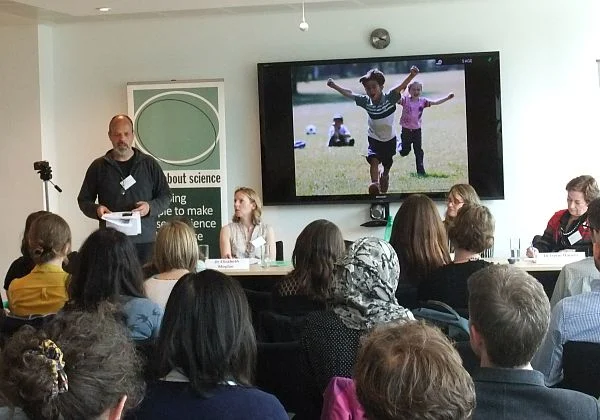Peer review: how exactly do I do that?
22 de julho de 2015 | 4 min lidos
Por Melissa Burke

Panel discussion featuring Elizabeth Moylan (BioMed Central), Mike Smith (Journal of Maps) and Irene Hames (Committee on Publication Ethics (COPE) alumni)
Researcher Melissa Burke reflects on her experiences at a recent Sense About Science workshop on the topic
I confess: I am a peer reviewer and don’t really know what I’m doing. Peer reviewing is a common part of the job of early career researchers (ECRs) and yet we receive very little training (or none at all) on how to peer review. Sense About Science aims to address this by running regular free half-day workshops entitled “Peer review: The Nuts and Bolts”. I went along to the May one to find out more.
The workshop began with a panel discussion featuring Elizabeth Moylan (BioMed Central), Mike Smith (Journal of Maps) and Irene Hames (Committee on Publication Ethics (COPE) alumni) which covered topics as diverse as the emotional rollercoaster of getting published, the importance of peer review, hints and tips for peer reviewing, and the evolution of scientific publishing.
The importance of peer review
Being a peer reviewer is as important for the careers of ECRs as it is for enriching the quality of published science. It helps to build your CV, networks and recognition as an expert in your field, and helps to improve your writing and editing skills. Being a peer reviewer also provides a way to give back to the scientific community and benefits the public by providing an assurance of the quality/reliability of published research.
Hints on peer review and where to find advice
The panel offered this simple but essential advice on being a peer reviewer:
Be diligent. Be timely. Be fair. Be factual. Be nice!
Communicate with the journal: tell them if you aren’t able to review a paper or if you are having trouble with it. They are there to help you.
If you’re looking for more practical advice there are some great online resources including:
Sense about Science: Peer Review: The Nuts and Bolts
Elsevier: Publishing Campus researcher training platform
Discussions between the panel and ECRs highlighted the need for better training of peer reviewers. Suggestions for improving training included encouraging more interaction and feedback between reviewers and the journals, and the development of formal training programs.
The nature of peer review
The nature of peer reviewing is constantly evolving and very different models are used by different journals. Current models of peer review include:
Single blind review: the conventional method where the authors don’t know the reviewers.
Double blind reviews: the authors don’t know the reviewers, and the reviewers don’t know the authors. This is now being offered by Nature.
Open reviews: The authors and reviewers are named and the reviewers’ comments are publicly available. This model is currently used by F1000R.
For ECRs it is important to be aware of these models and their unique advantages and disadvantages when submitting and reviewing papers.
Recognition for peer reviewers
One of the biggest concerns for ECRs at the workshop was the lack of recognition for peer reviewers. There was much discussion of possible ways to improve this with most ECRs agreeing that it was important to know if their review was good and if it was useful to the journal and authors.
To make sure that there is a formal record of the reviews you have done the panel had these suggestions:
Link your reviews to your ORCID ID (This is a unique researcher identifier. You can learn more here.)
When reviewing papers for your supervisor politely ask them to acknowledge your contribution (they are required to do so according to COPE guidelines).
Overall impression
By going to this workshop I gained strategies and resources to help me be a better peer reviewer and learnt a lot more than I expected about the evolving nature of peer review. I now feel more confident and excited about being involved in the peer review process!
Contribuidor
